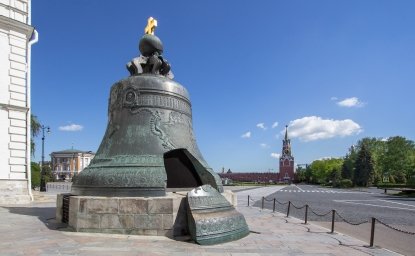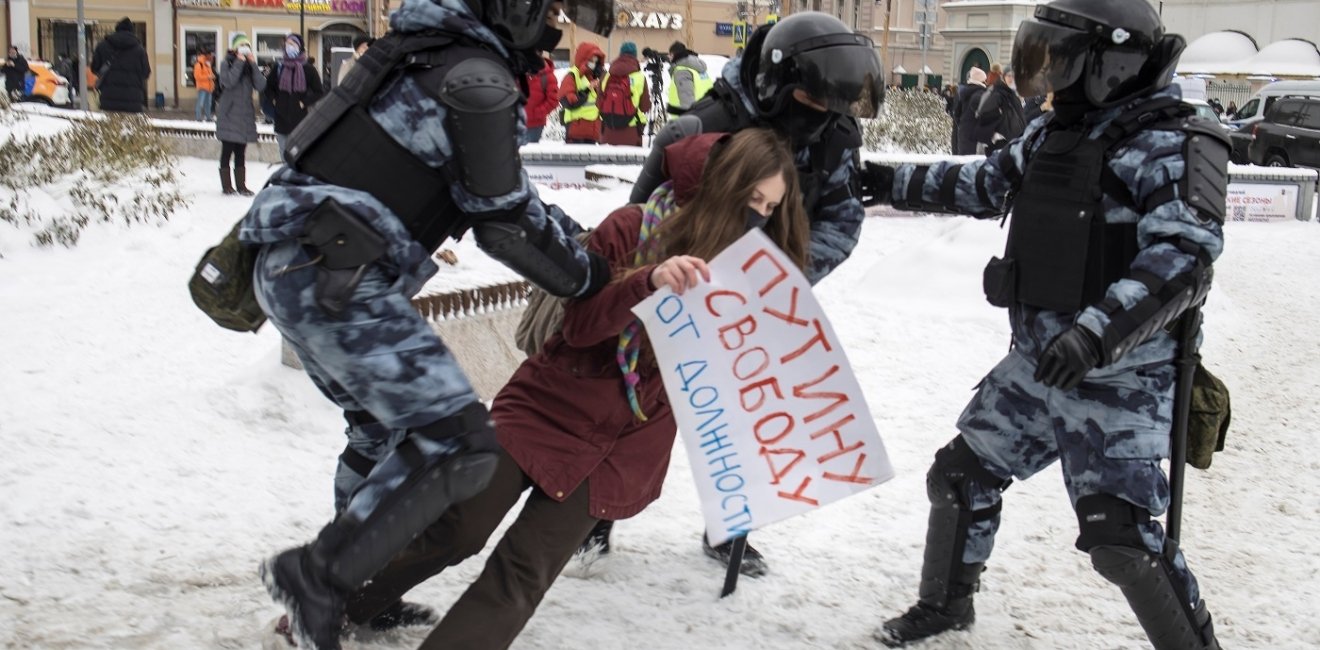
A blog of the Kennan Institute
In Krasnodar, a city in the south of Russia, a local couple has been detained after they sympathized with Ukraine in a private conversation in a restaurant, and another visitor joined their discussion. In Nizhny Novgorod, a mechanic at an aircraft factory was fined 30,000 rubles ($430) after the authorities received a report that he was tearing leaflets supporting the Russian military off the factory walls. In Tver, 160 kilometers northwest of Moscow, a local official reported on two women who had laid flowers and soft toys at a local memorial to victims of political repression as a tribute to the Ukrainians who had died in the shelling of a residential building in Dnipro on January 14.
In the small town of Kasimov, 300 kilometers from Russia, the police identified a woman who had left an antiwar message in a public bathroom in a local shopping mall. In Saratov, a city on the Volga river, a doctor in a local perinatal center received the same fine, 30,000 rubles, after she said she opposed the war in Ukraine. According to the court ruling, witnesses in the staff room also heard the doctor arguing against the mobilization announced by Putin in September.
In Moscow, there is hardly any reminder of the war, apart from the increased number of police and the officially installed letters Z and V, emblems of Putin’s war, which look like modern reincarnations of the ubiquitous Soviet slogan SLAVA KPSS (“Glory to the Communist Party of the Soviet Union!”). Yet in Moscow’s offices, people are increasingly cautious when talking about the war in the presence of their superiors or those they do not personally know well. Before, they would not have cared much who was listening. These days, the consequences can be severe.
Russia Silenced
Wartime censorship has become a score-settling tool. An innocent word, if said in an inappropriate place at an inappropriate time, can result in a long prison sentence. In April, Maria Ponomarenko, an activist and journalist in Barnaul, was arrested after she posted a comment about the Russian shelling of the Drama Theater in Mariupol on March 16, the single deadliest known attack on civilians to date, the Associated Press later reported, having killed up to 600 people inside and outside the building. Back then, Ponomarenko had no doubt: local authorities had targeted her specifically because two years earlier she had drawn the attention of Moscow’s law enforcement to corruption in a local orphanage. Now the prosecution is asking for a nine-year prison sentence for her.
As Putin’s war with Ukraine nears the one-year mark, the mounting stories of Russians rejecting it reflect the fact that this war does not enjoy the full support of the Russian nation. But mainly these stories break new ground in the relationship between state and nation in Russia.
In the years of Stalin’s Terror, opposing the government was simply impossible. During the soft totalitarianism of Brezhnev’s years, an open fight for freedom was restricted and repressed, yet feasible. A Chronicle of Current Events, the uncensored human rights newsletter, operated throughout the whole Brezhnev era and even disclosed its editorial team along the way. Today it would not succeed. Media, human rights watchdogs, grassroots initiatives—almost every independent Russian institution has been dismantled over the course of a few months.
Now, inside Russia, distributing the antiwar message requires secrecy. In Krasnodar, the activists producing and supporting the local antiwar newspaper refuse to give their names to journalists. Printing and distributing it, they claim, “allows everyone opposing the war to feel that they are surrounded by those who think alike and that the protest against the war does not only exist online.”
Inside Russia, the antiwar movement has gone underground, and the term “resistance,” reminiscent of World War II and Nazi Germany, has come into use. In Moscow, Russia’s most liberal, pro-Western city, the anti-Putin protest was strong and visible from the early 2010s. Moscow residents who oppose the war now live with the growing feeling that they have been invaded and have to share their lives with an occupying army.
For Russia, it is a totally new reality. Following its invasion of Ukraine, Russia suffered the biggest fall in position on the annual Economist Intelligence Unit Global Democracy Index, dropping from 132nd to 154th place, an authoritarian regime now “acquiring many of the features of a dictatorship.”
The decisive feature of this downfall is its incredible speed. For twenty years, Putin’s authoritarian rule was gradually fossilizing. The constitutional reforms of 2020 stripped Russia of what few constitutional checks and balances remained. In 2021, repressions and censorship in Russia reached a level never seen before. In 2022, with the start of Putin’s invasion of Ukraine, Russia went through an internal revolution: before our eyes, post-Soviet authoritarianism is turning into fascism.
The Russian Exodus
In 2022, Russia’s political regime experienced a phase change of the type that shatters the nation to the core. Today, the immediate impact of this change appears to be the greatest since the Russian revolution of 1917. From 1918 to 1921, up to two million Russians went into exile. That number included businessmen, the military, entrepreneurs, artists, scientists, young people wanting a future. According to Alexandra Burakova from Kovcheg, a voluntary support project aimed at helping emigrants who have been forced to leave Russia, up to one million Russians fled during the first months of the war, with up to another million joining them in exile after the mobilization was announced in September. The exodus has dramatically altered the Russian social landscape.
It is not only a statistical or cultural phenomenon. It is a policy. Against the backdrop of Russia’s unprecedented break with the West, Russian security officials, paramilitary groups, and pro-war bloggers, along with defense industry managers, loyal bureaucrats, and ideologically aligned artists, are replacing what remains of the relatively progressive, innovative, self-made community at the top of the Russian elite. According to Margarita Zavadskaya of the Finnish Center for Russian and East European Studies, the exodus has decimated the Russian IT industry, as well as the education and science sectors. Educated Russians who still remain in Russia feel as though they have been isolated and cornered in a ghetto, and fear further ostracization. Fear is their commanding spirit. The newly established legal framework allows stripping politically unreliable public figures of their civil rights or making them pay for their antiwar position with years in jail. Members of parliament are considering the possibility of seizing the assets of those who have left the country and speak out against the war.
In his half-fictionalized memoir, Defying Hitler, German journalist Sebastian Haffner gives an account of what took place on the German political scene in the months after the Nazis came to power. Political opponents and disloyal celebrities were murdered, jailed, or disappeared on a daily basis. But apart from this wave of sheer violence—on a scale nonexistent in Russia—the whirlwind progression of “the legal revolution,” which turned the Weimar Republic into a dictatorship, looks strikingly familiar.
Compared to historical precedents, Russia’s domestic revolution of 2022 may be less violent and repressive—and therefore less visible from the outside. It’s because instead of taking place in an open space, in a vibrant social and political ecosystem, it is developing in a confined chamber. At the very top, there is no change of power. The 2022 revolution has not led to a massive redistribution of property yet because the government has long seized control over major assets. There is no need to suppress the opposition since it has already been eliminated. Yet it qualifies as a social coup, a radical and swift overthrow of the existing social order.
Vladimir Putin can and most likely will lose the war he has started. Sooner or later he will withdraw from Ukraine, severely weakened, with no victory to show for his expenditure of lives and treasure. Russia will get out of this war isolated and poor, facing a grim economic future. But Putin’s failure at war—even Putin’s failure as such—does not automatically convert into a defeat for the domestic revolution he accomplished, a defeat, which would bring freedom to the Russian nation. Wars may be lost, leaders may fall, but, as history has continuously shown, to defeat a revolution is a whole different affair.
The opinions expressed in this article are those solely of the author and do not reflect the views of the Kennan Institute.
Author

Russian Journalist and Filmmaker

Kennan Institute
The Kennan Institute is the premier US center for advanced research on Eurasia and the oldest and largest regional program at the Woodrow Wilson International Center for Scholars. The Kennan Institute is committed to improving American understanding of Russia, Ukraine, Central Asia, the South Caucasus, and the surrounding region though research and exchange. Read more

Explore More in The Russia File
Browse The Russia File
Russian Media in Exile Finds Purpose and Global Relevance

Where to Find Ukraine in Trump’s Second Inaugural Address

Patience and Persistence as the Path to Ending the War

